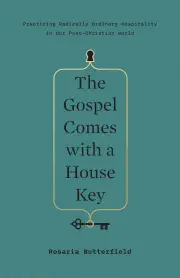The Gospel Comes with a House Key
I, like other readers, hoped for so much more from this book but instead felt it was dogmatic and lacked humility and I nearly abandoned it, feeling guilt– tripped that I could never attain the impossibly high level of hospitality promoted here.
And unfortunately, for all the good and heart warming stories contained in this book, ‘promoted’ summed up the emphasis here. Rosaria believes that ALL of us should be doing hospitality pretty much ALL the time ( ‘daily’ is repeated throughout the book). This is nowhere explicit in scripture and yet it was promoted as a non – negotiable! What would have been more edifying would have been to acknowledge how everyone is in a different situation with different gifts and some are more gifted than others at hospitality. Perhaps we could have had some simple, creative, attainable examples from other’s lives ( the single mum, the student, the retired etc) of how they seek to show hospitality.
Surely the biggest motivator for hospitality, aside from the command in scripture is the fact it models God’s grace toward us. His welcome. Because we have been welcomed, so we welcome others ( however that looks in the particular season of life we find ourselves in ). I do agree with Rosaria that we shouldn’t be constantly segregating our guests ( non Christian / Christian ) but rather make efforts to mix these two worlds together where possible.
Some of the things I do with hospitality, other believers would not do but that does not necessarily make them lazy or lacking in faith or ungenerous. They may need to be obedient in that area yes, but they may have legitimate reasons why they can’t do it often ( health issues, family crises etc ) and we have to be really careful we don’t look down our noses at those who seem to do very little hospitality. God knows their hearts, we do not. It seems wrong to write about what ‘we do’ as if it were the only acceptable way to do hospitality.
I think it’s wonderful that Rosaria can do so much. God has clearly gifted her for this role with incredible energy too! But that is Rosaria’s story and no one else’s. It is unique to God’s call on them as a family.
I am so grateful that we are not held up to that yardstick else we would all feel like failures.
We are to challenge one another to die to selfishness and live sacrificially, yes, but that will look different in different contexts, cultures and families and churches.
We live by grace alone and any out–working of that grace is not by compulsion but by love that the Spirit grows in us.
So sadly, I would not recommend this book to others, especially those who have a sensitive conscience and could easily feel overwhelmed by the legalistic standards promoted here.
Roz Owens
The Gospel Comes with a House Key
This book is an invitation to practise hospitality in a post–Christian world. But it is far from a how–to–do–it manual. Its core takes the surprising form of a personal account of an individual’s journey from a radical lesbian position to an equally thoroughgoing Christian lifestyle. Born into a talented but dysfunctional family, Butterfield shone at Catholic school and university, becoming a professor of English and women’s studies in her 30s. Setting out to write a book demolishing the Religious Right, she accepted the invitation of a visit to a Presbyterian pastor in order to get Christian background and material. What she got was Christian hospitality and acceptance, with no holds barred. Under that exposure her prejudices crumbled and she became an exponent of the faith she had sought to destroy.
So the book is an ode to Christian hospitality, not a prescription or an autobiography. A good part of it consists of a series of vividly painted episodes involving (among others) the author, her mother, a stray dog and a hopeless drug addict. These are frustratingly scattered throughout the book, so that the only way to get a coherent picture of any of the characters is to consult the index. The vignettes are interspersed between passages of Biblical exposition and illustrations of the do’s and don’ts of good Biblical hospitality, American–style. The essence of that is total acceptance and self–giving, to a degree that is deeply humbling to the reader.
The book is a feast of good things. It is the work of an excellent stylist, incisive or expansive as the need arises. It articulates Reformed theology attractively in an applied setting. It searches and uplifts in equal measure, and hopefully inspires as well.
Donald Mackay
The Gospel Comes with a House Key
The driving principle of this book is Butterfield’s biblical conviction that as you love your neighbours, and share your life with them, they may well become part of the family of God. In her articulate and unique style, Butterfield holds no punches as she outlines how if we accept the gospel, we should be prepared to practise ‘radically ordinary hospitality’. Throughout the explanations and persuasions she has threaded autobiographical illustrations. As with her previous two books, the springboard of it all is how the God of the Bible has been at work in and through her in remarkable ways.
I was struck by the deliberate and devoted way in which Butterfield and her family go about this radical hospitality, and loved the encouraging stories of fruitful results for the Lord’s glory. It really challenged me regarding my own relationships – or lack of – with my neighbours. I love the truth that God works through the most ordinary things of family life, whether it be eating together or walking a dog, for His glory and loves to welcome people into His family.
As I began reading the book, I found myself slightly in awe of the life the Butterfields are leading. That kind of awe that made me think I couldn’t possibly do what they are doing. But as I read on, I was relieved to hear her encouragements in the practical out–workings of all this and it began to feel a little more do–able, even just in a few small ways to begin with.
As with her previous two books, I found it a little frustrating that Butterfield champions her denominational ways of going about gospel living. I think this book is less dominated by the Presbyterian quirks than others, although it does rear it’s head every now and then.
Butterfield’s autobiography is inescapable in all her writing, and that’s true of this book as well. I think her insightful and challenging comments regarding how Christians relate to the gay community were helpful as well as reminding us of the remarkable way in which God worked in her through others offering her radical, loving hospitality.
I found this book compelling and I was challenged in so many ways to open up my home and share life, and so share the gospel with people.
Felicity Patterson
Challenged and excited me about hospitality
The driving principle of this book is Butterfield’s biblical conviction that as you love your neighbours, and share your life with them, they may well become part of the family of God. In her articulate and unique style, Butterfield holds no punches as she outlines how if we accept the gospel, we should be prepared to practise ‘radically ordinary hospitality’. Throughout the explanations and persuasions she has threaded autobiographical illustrations. As with her previous two books, the springboard of it all is how the God of the Bible has been at work in and through her in remarkable ways.
I was struck by the deliberate and devoted way in which Butterfield and her family go about this radical hospitality, and loved the encouraging stories of fruitful results for the Lord’s glory. It really challenged me regarding my own relationships – or lack of –with my neighbours. I love the truth that God works through the mostordinary things of family life, whether it be eating together or walking a dog, for His glory and loves to welcome people into His family.
As I began reading the book, I found myself slightly in awe of the life the Butterfields are leading. That kind of awe that made me think I couldn’t possibly do what they are doing. But as I read on, I was relieved to hear her encouragements in the practical out–workings of all this and it began to feel a little more do–able, even just in a few small ways to begin with.
As with her previous two books, I found it a little frustrating that Butterfield champions her denominational ways of going about gospel living. I think this book is less dominated by the Presbyterian quirks than others, although it does rear it’s head every now and then.
Butterfield’s autobiography is inescapable in all her writing, and that’s true of this book as well. I think her insightful and challenging comments regarding how Christians relate to the gay community were helpful as well as reminding us of the remarkable way in which God worked in her through others offering her radical, loving hospitality.
I found this book compelling and I was challenged in so many ways to open up my home and share life, and so share the gospel with people.
Felicity Patterson






